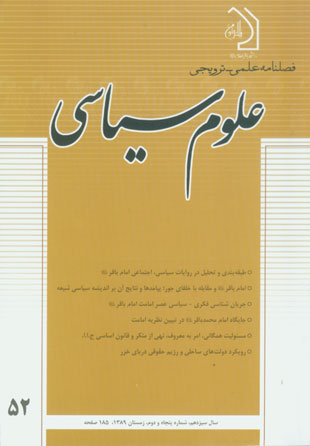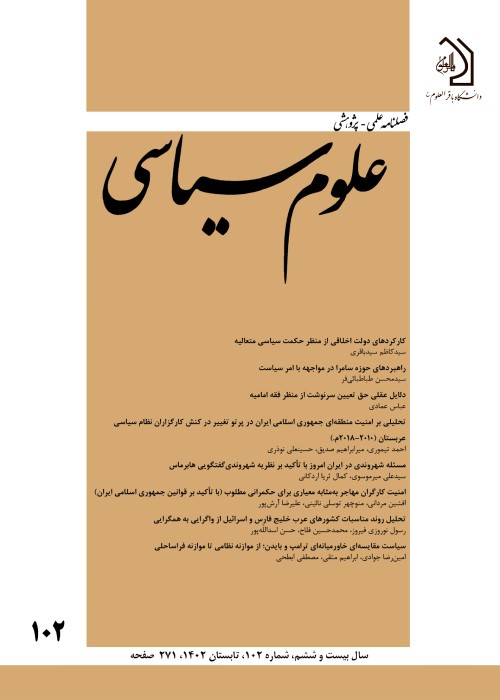فهرست مطالب

نشریه علوم سیاسی
سال سیزدهم شماره 4 (پیاپی 52، زمستان 1389)
- 185 صفحه، بهای روی جلد: 15,000ريال
- تاریخ انتشار: 1390/05/15
- تعداد عناوین: 7
-
- مقالات
-
صفحه 7مقاله پیش رو درصدد طبقه بندی و تحلیل صرفا روایات اجتماعی – سیاسی امام باقر است. اما گستردگی روایات اجتماعی – سیاسی وارده از امام باقر از یک سو و تکثر موضوعات معطوف به روایات از سوی دیگری دسته بندی و تحلیل روایات را بسی دشوار می نماید، با این وصف روایات فوق را در 7 موضوع شامل: ارکان و ویژگی های بنیادی جامعه، تاریخ سیاسی – اجتماعی، جنبه های سیاسی – اجتماعی مهدویت، مسایل سیاسی - اجتماعی، روابط سیاسی - اجتماعی امام باقر، قیام، مبارزه و روابط با سلاطین جور و هنجارها و صفات مطلوب جامعه شیعی، دسته بندی و تحلیل می گردد.
کلیدواژگان: روایات سیاسی، طبقه بندی، تاریخ سیاسی، روابط سیاسی -
صفحه 45زندگی سیاسی امام محمد باقر و سیره عملی آن حضرت در مبارزه با خلفای جور تاکنون از حیث اهمیتی که برای اندیشه سیاسی شیعه داشته، مورد توجه قرار نگرفته است. در این مقاله از خلال بررسی مواجهه آن حضرت با خلفای اموی زمانشان می توان مفرداتی اساسی در اندیشه سیاسی شیعه را که امام محمد باقر، واضع آن بود، دریافت. تاکید بر هویت مستقل شیعی و پیراستن آن از آنچه که این هویت مستقل را مخدوش می کرد، بیان خصائص امام در نزد شیعه به نحوی که آن را از سایر گونه های امامت نزد فرق دیگر ممتاز گرداند و با امامت بالسیف، امامت غیر منصوص و یا غلو در بیان صفات امام مشتبه و مغلوط نگردد و بالاخره طرح «تقیه» به منزله استراتژی مبارزه سیاسی شیعه، بخشی از تعالیم سیاسی امام محمد باقر است که از خلال مبارزات سیاسی آن حضرت با خلفای جور اموی مستفاد می گردد.
کلیدواژگان: امام محمد باقر، شیعه، امامت، غلبه بالسیف، تقیه، غلات، خلافت، بنی امیه -
صفحه 65تمرکز این نوشتار بر مقطعی از تاریخ اسلام است که در آن امام باقر به مدت 19 سال، هدایت معنوی و سیاسی جریان موسوم به علویان اثنیعشری را بر عهده داشتند. جریانات فکری- سیاسی آن روزگار هرکدام بر اساس مبانی فکری و کلامی خاصشان خود را مستحق خلافت و جانشینی پیامبر میدانستند. در نتیجه، چه جریانی قدرت را در دست داشت و چه جریاناتی برای کسب آن تلاش مینمودند و شرایط سیاسی خاصی را به وجود آورده بودند از پرسش های اساسی در این تحقیق است. امام باقر که خود هدایت جریان علوی اثنیعشری را در دست داشت، در مواجهه با هر کدام از این جریانات، مواضع خاصی را ابراز نمودند که در برابر جریان حاکم اموی مبتنی بر اصل تقیه و در برابر سایر جریانات منطبق با اصلاح و روشنگری بود. این نوشتار ضمن تحلیل خاستگاه، مبانی و عملکرد جریانات مهم فکری- سیاسی دوران امامت امام باقر (95-114ق) در صدد تبیین و تحلیل مواجهه امام باقر با جریانات فکری- سیاسی این مقطع از تاریخ اسلام است.
کلیدواژگان: امام باقر، جریان فکری، سیاسی، امویان، علویان، خوارج، عباسیان، مرجئه -
صفحه 93در بیان نقش امام محمد باقر در القاء تعالیم تشیع و از جمله مسئله «امامت»، به «تاسیسی» یا «تبیینی» بودن این نقش اشاره شده است. از سویی دیگر، برخی شبهه «تکامل تدریجی مذهب تشیع» را طرح کرده اند. «تفکیک بین مفهوم و اندیشه» در تحلیل تاریخ تشیع، «توجه به حساسیت مسئله امامت» و«تکامل فهم مخاطبان»، از جمله مواردی است که عدم توجه به آن ها موجب این شبهه شده است. «مفهوم» را در قالبی بشری و اندیشه را در ساحتی قدسی معرفی می کنیم و بر آنیم تا نظریه تدریج را متوجه «مفهوم» و اصرار بر اصالت را متوجه «اندیشه» و در نهایت، آسیب را ناشی از خلط این دو بدانیم. اساسا نه مفهوم امامت و ولایت از آن مفاهیم چندان ساده ای است که توانسته باشد در قالب الفاظ و متون تاریخی، هویت یابد و نه هر تاریخ نگاری می توانسته حقایق مربوط به امامت را در تاریخ خود ثبت کند. نتیجه آنکه نقش امام باقر، در قالب کارکردی تبیینی قرار می گیرد؛ اگر چه نوع واکنش محافل مخالف امام، کارکردی تمایزساز برای آن حضرت ایجاد کرده بود.
کلیدواژگان: امام محمد باقر(ع)، تاریخ تشیع، امامت، پیدایش تشیع، امامیه -
صفحه 113مسئولیت همگانی در همه ابعاد آن از جایگاه والایی در کشور های دموکراتیک برخوردار است؛ به گونه ای که در قانون اساسی این کشورها به آن پرداخته شده و سعی شده است در اصول قانون اساسی، هر سه گونه آن اعم از نظارت مردم بر مردم، مردم بر مسئولان و مسئولان بر مردم تدوین شود. قانون اساسی جمهوری اسلامی ایران نیز از این اصل مستثنا نمانده و ابعاد سه گانه مسئولیت همگانی در اصول مختلف آن آورده شده است. البته باید توجه داشت که این مهم در پرتو فریضه الهی امر به معروف و نهی از منکر صورت گرفته است. بنابراین نوشتار حاضر سعی دارد تبعات تدوین ابعاد سه گانه مسئولیت همگانی در قانون اساسی در پرتو فریضه الهی امر به معروف و نهی از منکر را مورد بررسی و واکاوی قرار دهد.
کلیدواژگان: مسئولیت همگانی، کنترل، قانون اساسی ج، ا، ا، فریضه الهی -
صفحه 145تحول نظام جهانی در اثر فروپاشی اتحاد جماهیر شوروی و ورود سه کشور جدید به جمع کشورهای حوزه ساحلی دریای خزر، وضعیت حقوقی این دریا و چگونگی بهره برداری از منابع نفت و گاز آن اهمیت ویژه ای پیدا کرده است. هدف از این تحقیق، بررسی مواضع و ایستارهای دولت های ساحلی، به ویژه استراتژی جمهوری اسلامی ایران و نیز آخرین تحولات رژیم حقوقی دریای خزر می باشد.
در این مقاله تلاش شده است فرآیند موضعگیری دولت های ساحلی، همراه با ارائه راهبرد ها و راهکار های اجرایی لازم برای تامین حقوق کلیه دولت های ساحلی، به ویژه منافع و امنیت ملی جمهوری اسلامی ایران، تبیین شود. تحقق این اهداف، تنها با اجماع نظر و رضایتمندی کلیه دولت های پنجگانه ساحلی بدون دخالت دولت های فرامنطقه ای میسر خواهد شدکلیدواژگان: رژیم حقوقی، دریای خزر، همکاری، منافع ملی، اجماع نظر -
صفحه 170
-
Page 7The present article is to merely classify and analyze the political and social traditions of Imam Baqer (PBUH). But the extensiveness of the political and social traditions on the one hand and the abundance of the issues related to traditions on the other hand make the classification and analysis of them so difficult. Therefore, the present traditions are classified under the seven categories such as: the fundamental principles and characteristics of society, the political -social history, the political-social aspects of Mahdaviat, the political- social issues, the political-social relationships of Imam Baqer (PBUH), uprising, campaign and relationships with the brutal governors, and the desirable characteristics and traditions of the Shiite society.
-
Page 45The political life of Imam Baqer (PBUH) and his practical conduct against the brutal caliphates have not been considered yet from the viewpoint of the vital role they played in regard with the political thoughts of Shiism. In this article, through a study on Imam Baqer’s encounter with the Umayyad caliphs, some fundamental issues in the political thoughts of shiism have been extracted which were established by Imam Baqer (PBUH).Part of the issues as political instructions of Imam Baqer (PBUH) which are implied from his political encounter with the brutal Umayyad caliphs include: the emphasis on the independent identity of Shiism and its purity from any thing which might alter it; explanation of an Imam's characteristics to the shiites in order to make it distinguished from the other definitions of Imamate by the other sections, and so that it is not mistaken for Imamate bi al-Saif (Imam carrying sword), unapproved Imamate, or exaggerated Imamate; and finally, the principle of concealment as a political strategy of shiism.
-
Page 65The focus of this writing is on a period of history of Islam in which Imam Baqer (PBUH) was responsible for the spiritual and political guidance of Twelve-Imam Alawites lasting for nineteen years. The intellectual and political events of that time, each according to its own special intellectual and theological basis, considered itself the most rightful inherit the prophet's caliphate. Therefore, special political conditions had been created by the ones who were in power and the ones who wished to seize. Imam Baqer (PBUH) who led the twelve-Imam Alawites took specific stands against each of these two processes: that is, adopting the strategy of concealment against the Umayyad governors and the strategy of illumination and reform for the other groups. In addition to the analysis of the origins, the bases and the revenue of the main intellectual-political thoughts and views at the period of Imam Baqer, this writing is to clarify and analyze the Imam Baqer's (PBUH) dealing with the intellectual-political events of this period of the history of Islam.
-
Page 93In the explanation of Imam Baqer’s role in the induction of instructions of Shiism including the issue of Imamah, some have considered it as an initiating role and some others have considered it as a clarifying role. On the other hand, some have stated the doubtful stand of the "gradual evolution of the Shiism". “The separation of concept and thought” in the analysis of shiite history, “paying attention to the sensitivity of Imamate issue”, and the evolution of addressee’s comprehension”, are the factors that ignoring them have made this doubt. We introduce the “concept” in a human model and “thought” in a holy realm and we are going to transfer this fact that the idea of gradation is due to concept and consisting on reforms is due to thought and finally the damage is due to the mixture of these two factors. Basically, the concept of Imamate and the allegiance out of it is not a simple issue to be identified through the words and historical texts and not any historian can register the facts related to Imamate in his history. Therefore, the role of Imam Baqer (PBUH) will be put in a practical clarification model; although the opposite reaction of Imam had resulted a diverse output for him.
-
Page 113General responsibility in its all dimensions has a great position in democratic countries; so that it is considered in the fundamental law of these countries and it was endeavored to compile each of its three principles such as the supervision of people on people, people on the ones in charge, and the ones in charge on people as the principles of fundamental laws. The fundamental law of Islamic Republic of Iran is not exempt from this basis and the three dimensions of general responsibility exist in its various principles. Of course, it should be noted that this major issue was done under the shadow of divine duty of enjoin to the good and probed to do evil. Therefore, the present writing is to consider the compilation of the three dimensions of general responsibility in the fundamental law under the shadow of divine duty of enjoin to the good and probed to do evil.
-
Page 145The transformation of global system due to the collapse of Soviet Union and the entrance of three new countries to the collection of the countries in the coastal area of Khazar Sea, the lawful situation of this sea and the way of exploitation from its sources of oil and gas have given it high importance. The goal of this research is the consideration of the situation and stands of coastal governments especially the strategy of Islamic Republic of Iran and also the last changes of lawful regime of Khazar Sea.In this article, it has been tried to clarify the process of taking position of coastal governments along with presenting the necessary executive strategies to provide the rights of all the coastal governments especially the benefits and the national security of Islamic Republic of Iran. The achievement of these goals is merely possible through consensus of thoughts and the satisfaction of all the five coastal governments without the interference of beyond-regional governments.


